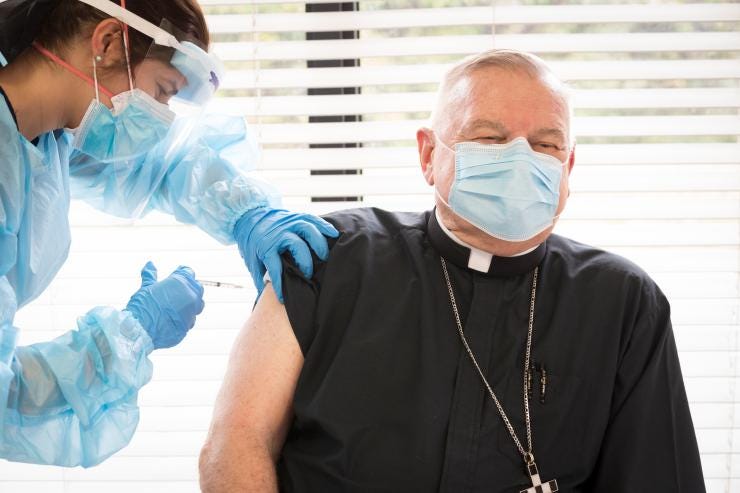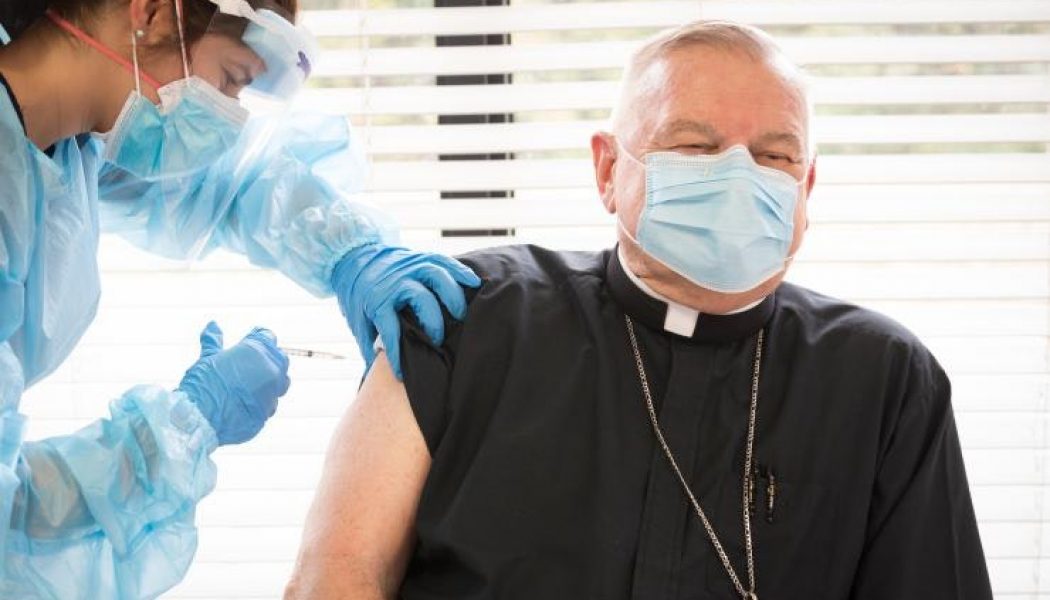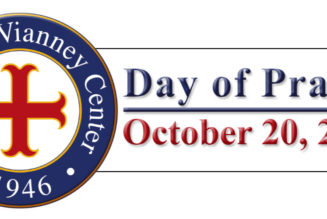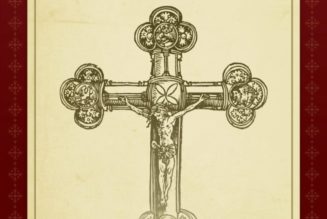Since Covid-19 vaccines began to be discussed, Catholics have raised concerns about the moral and ethical aspects of taking them. While the Vatican and the USCCB have weighed in on the subject, a lot of Catholics still have questions.
To answer those questions, The Pillar brings you The Ultimate Catholic Coronavirus Morality Explainer.™

The Pillar asked bioethicist Michael Deem to help us make sense of the vaccines and the Church’s moral teaching. He came back with a lot — answers to questions you have, and some you hadn’t thought of yet.
Read below for a basic snapshot, and then keep going for thorough answers to your questions about the morality of the vaccine:
In December 2020, the Congregation for the Doctrine of the Faith (CDF) and the United States Conference of Catholic Bishops (USCCB) independently issued statements on the morality of accepting COVID-19 vaccines that were developed or tested utilizing cell strains derived from the tissues of fetuses aborted decades ago.
The CDF’s Note on the Morality of Using Some Anti-COVID-19 Vaccines and the USCCB’s Moral Considerations Regarding the New COVID-19 Vaccines align in the guidance they provide to Catholics.
In sum:
-
Acceptance of the COVID-19 vaccines developed, researched, or tested utilizing fetal cell lines is morally permissible when no alternative COVID-19 vaccine is available or accessible.
-
An action that involves remote cooperation in evil is permissible, or even encouraged, when there are grave moral reasons that are proportional to or outweigh moral badness of this cooperation.
-
The proportional moral reasons for acceptance of the vaccine are the promotion of community health and prevention of serious risk of harm, which are grounded in the fundamental moral and social principle of the common good.
The Church’s guidance has generated considerable commentary, some of it reliable, some less so.
Some of the confusion and resistance to the CDF and USCCB statements seems to stem from misunderstanding the nuanced and complicated moral tradition of the Church, from which the CDF and USCCB draw. This primer aims to be a reliable guide to both the CDF and USCCB guidance, and the Catholic moral tradition that informs these positions, as well as a resource for bishops, pastors, and lay ministry leaders who wish to provide guidance about the morality and science of the COVID-19 vaccines.
The focus of this primer is solely on the moral question of receiving the COVID-19 vaccines – it does not address questions related to those who produce the vaccine.
Here are the questions you might have:
What principles do the CDF and USCCB cite when they say it is ok to receive COVID-19 vaccines that are linked to past abortions?
The principle of the common good is the key to understanding the CDF and USCCB guidance on receiving COVID-19 vaccines that were developed utilizing fetal cell lines:
The CDF explains that:“[F]rom the ethical point of view, the morality of vaccination depends not only on the duty to protect one’s own health, but also on the duty to pursue the common good.” (emphasis original)
The USCCB’s guidance adds: “In this way, being vaccinated safely against COVID-19 should be considered an act of love of our neighbor and part of our moral responsibility for the common good.”
Perhaps the clearest definition of the common good was given by the Second Vatican Council’s Gaudium et spes: “The sum total of social conditions which allow people, either as groups or as individuals, to reach their fulfillment more fully and easily.”
But it was Pope Pius XI who began to speak of the “norms of the common good,” that is, duties of “social justice” that fall on individuals. Those duties are grounded in the value of the common good; their content and specificity arises from the particularly social and political orders in which individuals find themselves. Hence, the CDF and USCCB expressly tie the COVID-19 pandemic and communal health to the threats to the common good.
The Church teaches that the principle of the common good is a fundamental moral and social principle. Much of the confusion over this guidance that I’ve seen on Catholic social media and news sites fails to note this very foundation of the CDF’s and USCCB’s positions.
While the COVID-19 vaccines no doubt can protect the health of recipients, the CDF and USCCB focus on how reception of the vaccine promotes the common good through protecting the health of the community and reducing the risks of harm associated with contraction of COVID-19 for especially vulnerable persons.
One year into the pandemic, we now have substantial scientific and medical evidence that COVID-19 disproportionately increases risks of morbidity and mortality for pregnant women, unborn children, the elderly, and individuals with chronic diseases. We should be cautious against any temptation to intellectual laziness or moral viciousness, which could dispose us to dismiss these risks of harm for others or minimize the severity of the pandemic.
The Church teaches that promoting the common good “requires constant ability and effort to seek the good of others as though it were one’s own good.”
I understand that the principle of the common good applies to our moral lives during the pandemic. But that’s pretty abstract. What specific ‘norms of the common good’ does the Church have in mind with the vaccine?
The CDF and the USCCB make clear that every individual has a particular moral responsibility – grounded in the common good – to protect others from risk of exposure to the virus that causes COVID-19.
The CDF and the USCCB derive more specific and particular moral norms about the pandemic from the general principle of the common good, in light of facts about the particular risks of harm the pandemic poses to individuals.
So what are the specific norms? The CDF gives what we might call a moral branching logic. Holding fixed what we know epidemiologically and medically about the pandemic and COVID-19’s progression after infection, there are two ways to discharge one’s moral responsibility:
-
Accept a vaccine to prevent or significantly slow the spread of COVID-19 infection: “In the absence of other means to stop or even prevent the epidemic, the common good may recommend vaccination, especially to protect the weakest and most exposed.”
The USCCB concludes that accepting the vaccine “should be considered an act of love of our neighbor and part of our moral responsibility.” However, if one chooses to accept a vaccine linked to fetal cell lines, then additional moral responsibilities are incurred (more on that below).
-
Decline the vaccine, but take specific preventative measures to avoid increasing risk of harm to others. If one declines the COVID-19 vaccine, one “must avoid any risk to the health of those who cannot be vaccinated for medical or other reasons, and who are the most vulnerable,” the CDF explains.
The reason one has this moral responsibility after refusal is because one would still incur moral obligations on the basis of the principle of the common good. You’ll find more on those obligations below.
Let’s start with taking the vaccine. Just to be clear, is the Church really saying it is morally permissible to accept a COVID-19 vaccine, even if it’s linked to past abortions?
The short answer is, yes, but under certain conditions.
On two occasions, the CDF has weighed in authoritatively and directly on the question of whether accepting vaccines that are linked to cell lines derived from the tissue of aborted fetuses is morally permissible.
In 2008, the CDF issued an instruction on bioethical controversies, called Dignitatis personae.
The text addressed questions about the morality of utilizing embryonic stem cells and fetal tissue in medical research (among other new and emerging bioethics issues). It specifically addressed the matter of whether parents may licitly accept childhood vaccines that were manufactured utilizing fetal cell lines derived from the tissue of previously aborted fetuses.
The CDF said that “danger to the health of children could permit parents to use a vaccine which was developed using cell lines of illicit origin,” and that acceptance of such vaccines does not necessarily constitute an endorsement of the use of these cells in medical research.
The CDF’s 2020 guidance on the coronavirus cites and affirms the 2008 position, and extends it to COVID-19 vaccines currently approved for distribution by regulatory bodies (e.g, the Food and Drug Administration in the United States) and being distributed.
As of Feb. 22, only two COVID-19 vaccines are approved for distribution: the mRNA vaccines developed by Pfizer/BioNTech and Moderna.
It’s important to note that neither the 2008 instruction nor the 2020 note simply states that accepting these vaccines is permissible without qualification.
A number of other conditions – which the CDF calls “proportional reasons” – must be present in order for receiving the vaccines to be acceptable, including the lack of alternative vaccines that do not have links to past abortions, and solid scientific evidence that these vaccines produce the good effects of protecting individual and community.
Are some vaccine manufacturers using fetal remains in the development and production of their vaccines?
There is no reason to think that fetal remains are being used to develop coronavirus vaccines. The fetal cell lines used in development, testing, or production of childhood, adult, and COVID-19 vaccines (cell lines HEK239, MRC-5, PER.c6, and WI-38) are lines of replicating cells derived from fetal tissue decades ago.
Vaccine manufacturers are not utilizing the bodies of fetuses, tissues of fetuses, or any other remains of fetuses aborted in the past or presently.
The cell lines in question are not original cells from a fetus’s body, but rather generations of millions, perhaps billions, of replication. They are no more part of a fetus’s remains than would be, say, the replications of my skin cells that an ambitious scientist swabbed off my coffee mug.
In other words, the replications are not from our bodies, but the original cells and tissues are.
We can, therefore, both morally accept the COVID-19 vaccines that are currently approved for administration, and affirm Bishop Joseph Strickland’s message to his local church “to reject any vaccine that uses the remains of aborted children in research, testing, development, or production.” This is because the remains of aborted fetuses were not utilized in the development of COVID-19 vaccines – or any childhood vaccine. However, were it to be the case that a vaccine were developed and tested on the actual remains of an aborted child, then Bishop Strickland’s message would prove prophetic.
Do the COVID-19 vaccines contain fetal cells?
Briefly, no. The Pfizer/BioNTech and Modern vaccines do not utilize fetal cell lines for production of the vaccine, so there would be no reason to believe they contain fetal cells. The AstraZeneca/Oxford and J&J vaccines utilize fetal cell lines for production, but production would involve extracting their adenoviruses from the cells prior to packaging. There is the theoretical possibility that these vaccines contain intracellular components as an unintended effect of this extraction.
—
I read on social media that the COVID-19 vaccine can cause infertility in women – is that true?
There is no evidence to support this fear. However, a study published in January 2021 suggests a possible link between natural COVID-19 infection and adverse effects on male fertility, though experts have raised questions about the study’s design and implications for a broader population.
—
Wait, you said the Vatican was talking about this in 2008. But I’ve heard that the current view of the CDF is a novel rationalization, brought on by global panic over COVID-19. What’s the deal?
That’s right. Dignitatis personae was issued by the CDF under Pope Benedict XVI’s pontificate, and he approved the instruction on June 20, 2008. Dignitatis personae is one of the most important magisterial documents on bioethics.
But Dignitatis personae was not the first time the CDF weighed in on the morality of vaccines linked to fetal cell lines.
In 2003, under the pontificate of Pope St. John Paul II, the CDF received an inquiry about whether parents may permissibly accept a brand of Rubella vaccine for their children. The controversy? The initial development of the Rubella vaccine by Dr. Stanley Plotkin involved growing the rubella virus in a cell strain derived from the lung tissue of an aborted fetus.
The CDF, headed by then-Cardinal Joseph Ratzinger, commissioned the Pontifical Academy for Life (PAL), to address the inquiry.
PAL issued its response in 2005. The response concluded that parents may licitly accept the rubella vaccine, or any other routine childhood vaccine manufactured with the use of fetal cell strains, on three grounds:
-
First, acceptance of these vaccines constituted for parents only “very remote mediate material cooperation, and thus very mild, in the performance of the original act of abortion.” (emphasis in the original)
-
Second, the threat to children’s or the public’s health is sufficiently grave in cases such as rubella — which is exceptionally dangerous for unborn children — that acceptance of the vaccine directly promotes a great good.
-
Third, parents may not have alternative vaccine choices, which do not have this connection to fetal cell strains. In the U.S., for example, there is no alternative for the MMR, Varicella, Hepatitis C vaccines, all of which were developed or produced using fetal cell lines.
Thus, the CDF’s 2020 note on coronavirus stands in a nearly two-decades-long development of the Church’s view on the morality of accepting vaccines developed utilizing fetal cell stains, crossing three pontificates. While much of Catholic social media has fixated on the Church’s view on accepting the COVID-19 vaccine, the basis for that view was developed long before the COVID-19 pandemic.
Two decades is not a very long stretch of time in the Church’s life. Should we really think that a relatively new teaching on the morality of vaccines is authoritative?
The CDF is an authoritative office within the Roman Curia for instruction on faith and morals, and its Dignitatis personae is an instruction on morality (i.e., teaching) that bears the authority of Pope Benedict XVI.
The content of the Church’s documents is authoritative insofar as it extends the Church’s moral teaching on the common good and vaccines to the specific question about COVID-19 vaccine acceptance, and relies on accurate scientific information.
Many of the moral questions that Dignitatis personae takes up (not unlike some of the questions taken up in Evangelium vitae) were just emerging from scientific advancement and practice when the document was published. This does not mean that every word of the document must be believed as an article of faith — but it does mean the document can’t be just set aside, because it is an affirmation from the Church of how she understands perennial moral principles to apply to new situations.
The recent CDF and USCCB guidance align with the teaching of Dignitatis personae, and extend the Church’s longstanding moral teaching on the common good to the specific moral questions facing us today in the pandemic.
But isn’t the Church contradicting itself when it condemns abortion as intrinsically evil but states that accepting these vaccines linked to abortion can be morally justified?
There are two notions of “contradiction” in the Church’s intellectual and moral tradition.
The first is that a contradiction is a logical relation between propositions in which both cannot be true at the same time. The proposition “X is p” and the proposition “X is not-p” cannot be both true, logically speaking. Affirming both propositions is, thus, a contradiction (logically speaking).
Consider, then, the proposition “Abortion is impermissible” and “Accepting vaccines manufactured using fetal cell lines is permissible.” These proposition can both be affirmed without logical contradiction, since the latter in no logical sense depends on or entails the proposition “Abortion is permissible.” So, there’s no logical contradiction in the CDF’s position.
Another conception of contradiction is mentioned in two papal encyclicals,Humanae vitae and Veritatis splendor. Let’s call this notion “practical contradiction,” to distinguish it from the logical kind.
A practical contradiction occurs when one performs an intrinsically evil action – that is, an action that is never morally permissible, regardless of one’s intention or circumstances – because it is opposes in itself the moral order. The Church has been very clear about what sorts of actions (formally ‘act-types’) it regards as intrinsically evil, among which are murder, genocide, adultery, abortion, and sexual assault.
Acceptance of a vaccine is not an intrinsically evil act-type, since the object of the act — individual and community health — is not by its nature opposed to the moral order. Instead, acceptance of routine and emergent vaccines is ordered toward the good. Because of that, a particular instance of accepting of a vaccine could be rendered ethically problematic only by the circumstances in which it is accepted and administered, or by the intention of the recipient.
Thus, if acceptance of a given vaccine – say, a COVID-19 vaccine – is morally wrong, it would not be because the act-type is intrinsically evil. If acceptance of a COVID-19 vaccine (or Rubella vaccine for one’s child) is morally wrong, it would have to be because of the circumstances (e.g., the vaccines were developed or tested utilizing fetal cell lines) or the intention of the recipient.
Even if the act-token is morally wrong, it would not involve a practical contradiction, from the perspective of moral theology.
Hence, the CDF discusses the morality of receiving these vaccines not in terms of the intrinsic moral value of the act-type, but in terms of cooperation in evil in particular instances of acceptance of these vaccines.
Hang on – there’s that jargon again from the CDF statement: cooperation in evil. Can’t we just say that cooperation of evil is always wrong, according to the natural law, and leave it at that?
Good question.
You are probably thinking about St. Thomas Aquinas’ formulation of the first principle of practical reason: “Good ought to be done and pursued and evil ought to be avoided” (Summa Theologiae I-II q. 94 a. 2). This general principle of the natural law is indeed, according to Aquinas, the basis of more specific principles and moral obligations.
But as even Aquinas notes, in our concrete, practical lives, we are sometimes faced with scenarios where choosing to promote the good involves also bringing about a morally bad outcome. In some such cases, it might be justifiable to bring about a foreseeable but unintended evil in pursuit of a legitimate good. The most familiar example Aquinas gives is killing in self-defense (Summa Theologiae II-II q. 64 a. 7).
Killing in self-defense might be justified morally where one acts with the intention to preserve one’s own life against an assailant (good object), but in so doing and without intention kills the assailant (bad effect).
Aquinas’ discussion of killing in self-defense gave rise to what has become known as the “doctrine of double effect” in the Catholic moral tradition. According to this doctrine, an action that produces both good and bad effects may be morally justified only if the good effect of the action is what is intended by the agent, the bad effect is not a means to produce that good effect, and the good effect is proportional to the bad effect.
A contemporary example might be a surgical intervention for an ectopic pregnancy, which promotes the women’s health and prevents serious harm to her (good ends), but foreseeably results in the death of the unborn child she is carrying (bad effect). Insofar as the surgeon intends to promote the woman’s health and prevent her significant harm or death in conducting the surgery, the surgeon understands that the intervention will bring about the death of the embryo (bad effect). Further, preserving her life is proportional to gravely bad effect of the embryo’s death.
Why this mention of the Church’s long and nuanced tradition of the doctrine of double effect?
-
First, it is clear that Catholic moral tradition holds that we might be justified in acting in ways that foreseeably and non-instrumentally bring about bad or evil effects, when our intention in action aims at some proportional good.
That an action directly brings about a bad outcome or evil does not necessarily mean that the action itself is morally impermissible (as the doctrine of double effect shows). Unless the action itself is intrinsically evil, we need more information to appraise its moral quality.
-
Second, the doctrine of double effect addresses the direct, proximate effects that our actions bring about. That is, double effect addresses the outcomes our agency causes.
When the Church discusses cooperation in evil, the matter is not whether our action is intrinsically evil, nor is it a matter of the effects our action directly produces. Rather, cooperation in evil means that our action stands in some connection to the bad action or bad outcomes of other people’s action.
This is why — I think — interpreting the CDF’s rationale on the permissibility of accepting COVID-19 vaccines as double effect reasoning is incorrect. The doctrine of double effect applies to actions of the principal agent (i.e., the one whose action is being morally appraised); while the doctrine on cooperation of evil applies to actions of a cooperating agent.
-
Third, if there are conditions in which an agent may permissibly act in such a way that an unintended bad effect issues directly from that action, it seems rather plausible that there might be circumstances in which merely cooperating in a bad action or effect is permissible, despite the duty to avoid evil. And this is precisely where a more careful look at cooperation in evil is warranted.
Is the formal/material distinction with cooperation of evil a part of the Church’s moral tradition, or just a way of rationalizing sinful action?
The formal-material distinction in Catholic moral thought dates back at least to St. Alphonsus Liguori (1696-1787), a Doctor of the Church and one its greatest moral theologians. However, the distinction appears to operate tacitly in magisterial teaching as early as Pope Innocent XI’s 1697 bull, Sanctissimus Dominus.
St. Alphonsus’s development of the distinction in his Theologia Moralis seems to have most influenced the Church’s moral teachings on cooperation with evil (in much the same way that Aquinas’s discussion of double effect influenced the Church’s moral doctrine).
If you want a brief explanation of this distinction, keep reading. Otherwise, feel free to jump to next question.
Cooperation in evil can be formal, where one contributes to the carrying out of a morally bad action either through sharing the intention of the principal agent, voluntarily and knowingly contributing to the carrying out of the principal agent’s willed action, or commissioning a morally bad action. For example, if I endorse or encourage someone’s intention to murder, or I intentionally act so as to contribute to the completion of the act of murder (e.g., by knowingly and willingly supplying the weapon used to carry out the murder, whether or not I shared the intention to murder), or I commission someone to perform murder (e.g., murder-by-hire), then I formally cooperate in the evil of the murder. Even though I do not perform the act of murder itself, I share moral responsibility. Thus, the Church holds that formal cooperation in evil is always morally wrong.
But cooperation in evil can also be material, where our actions do not bear on the intention or will of the principle agent, but rather contribute to or participate in the bad action itself. Material cooperation might range from directly or indirectly enabling another’s bad action – say by, to doing no more than merely participating in some distant manner in the outcomes of that bad action. The degree of one’s moral responsibility consequently co-varies with the degree of one’s cooperation in evil: formal cooperation entails full moral responsibility for the action in question, but moral responsibility diminishes as one’s material cooperation becomes causally more distant from the principle agent’s bad action – from immediate (we provide directly or indirectly the means for the bad action), to proximate mediate (we contribute in a non-necessary way to the principle bad action), and to remote mediate (we participate in the action or action’s effects).
The CDF, PAL, and USCCB have consistently maintained that acceptance of vaccines developed utilizing fetal cell lines is remote material cooperation in the evils of abortion and the posthumous injustice of using aborted fetus’s bodies for research. According to moral doctrine of the Church, while there is a moral duty to avoid evil – including cooperation in evil – there may be serious moral reasons that are proportional to (i.e., either roughly equivalent in gravity or outweighing) the duty to avoid remote material cooperation. In such cases, remote material cooperation in evil is permissible.
Why does the Church say that accepting a COVID-19 vaccine that was developed or tested utilizing fetal cell lines is remote material cooperation?
That acceptance of these vaccines is not formal cooperation in evil is obvious. My acceptance of a COVID-19 vaccine does not involve sharing the intention of those who performed the elective abortion in 1973, commissioning this action, or contributing to that act of abortion. Nor does my acceptance of the vaccine intend, commission, or contribute to the posthumous harm to the fetus of taking its tissues and developing the HEK239 cell line. These two harms – the abortion and the posthumous exploitation of a human body – are the two evils the Church is referring to.
Insofar as my acceptance of these vaccines involves cooperation of evil, it must be material cooperation, since it is not formal. And this cooperation is remote, because my acceptance does not provide the means and support to carry out the past abortion or posthumous exploitation, nor does it contribute directly to continued posthumous exploitation extended through the use of fetal cell lines.
Acceptance of the vaccine is linked to an elective abortion and posthumous harm in a wayward fashion – while it involves some participation, that participation is causally remote from these actions. The 2005 PAL statement even qualifies such cooperation further, by calling it “very remote cooperation.”
Some bioethicists have expressed doubt that the CDF is correct in using the cooperation in evil framework for considering this moral questions. They suggest that cooperation in evil only makes sense in a moral analysis if we are considering cooperation prior to or concurrent to the evil action. While this seems correct in cases of formal cooperation in evil, let me suggest two reasons why their doubt is unjustified.
First, the Catholic moral tradition does not characterize material cooperation as temporally restricted to the period prior to or concurrent with the evil action. In fact, St. Alphonsus provides clear examples of material cooperation in evil that occurs after the principal agent’s evil action (e.g., holding a ladder for a thief after a burglary).
Second, and more important, the continued and unnecessary use of fetal cells lines in the development of vaccines and other medical therapies (indeed, most childhood vaccines were not developed or produced using these cell lines) might constitute an instance of what Pope ST John Paul II characterized as a “structure of sin.”
The continued use of fetal cell lines for developing, testing, and producing vaccines creates a condition in which acceptance of these vaccines is linked to an on-going violation of human dignity. So acceptance of vaccines developed utilizing fetal cell lines is not merely a matter of “benefiting from ill-gotten gains,” but a cooperation in on-going structure of sin.
There is a moral duty to avoid remote material cooperation in evil, whenever possible. That duty is not absolute, as it is with respect to formal cooperation. There may be serious moral reasons for an action that involves remote material cooperation in evil. Proportional reasons can make it permissible or even morally responsible to perform this action. That is precisely what the Church says about accepting not just the COVID-19 vaccines, but also routine childhood vaccines that were developed utilizing fetal cell lines.
—
But what good could be proportional to the evil of abortion?
The CDF, PAL, and USCCB do not claim that promoting community health and prevention of harm to the vulnerable is proportional to an act of abortion. Rather, the question is whether those norms of the common good are proportional to the duty to avoid cooperating materially and remotely in evil. This is a crucial difference, and misunderstanding it has led to some confusion about the Church’s view.
The CDF and USCCB say that because of the negative impact of COVID-19 on the common good, individuals are morally responsible for making effective efforts to prevent community spread of the virus. From the standpoint of reason, based on our best science, vaccination is the safest and most effective means to accomplish this. Thus, the CDF and USCCB conclude that there are sufficient moral reasons to accept the vaccine, even though doing so involves very remote material cooperation in evil.
That idea is the rationale behind the PAL’s 2017 statement to Italian Catholics that “all clinically recommended vaccinations can be used with a clear conscience,” and that “use of such vaccines does not signify some sort of cooperation with voluntary abortion.” The statement pertains to childhood vaccines such Rubella and Varicella that were developed utilizing fetal cell lines and for which no ethically irreproachable alternative is available.
—
But I’m not obligated to accept the vaccine, right? The CDF says that I can refuse the vaccine, doesn’t it?
The 2020 CDF guidance expressly affirms that there is no absolute moral obligation to accept any vaccine.
The CDF also notes that individuals may refuse the vaccine as a matter of conscience, but adds that doing so would leave the norms of the common good discussed above unsatisfied: “Those who, however, for reasons of conscience, refuse vaccines produced with cell lines from aborted fetuses, must do their utmost to avoid, by other prophylactic means and appropriate behavior, becoming vehicles for the transmission of the infectious agent.”
But the CDF also explains that COVID-19 vaccine refusers have additional moral duties to do as much as possible to prevent increasing risk to others, since refusal of the vaccine entrenches risk to others. Such “prophylactic means and appropriate behavior” presumably are a matter of epidemiological and public health guidance.
One year into the pandemic, there is remarkable consensus among experts and researchers that wearing face masks and avoiding close social proximity to others in public spaces are extremely effective for preventing and slowing transmission of COVID-19. If, indeed, these are the most effective preventative measures for protecting others’ health, then it could be argued that those who refuse the COVID-19 vaccine out of conscience have a moral responsibility to follow those evidence-based public health guidelines.
The CDF and USCCB do not see the choice between acceptance and refusal of the COVID-19 vaccine as equally prudent. Both state that careful reflection on the Church’s moral tradition and a reasoned engagement with the relevant sciences should lead us to see that acceptance (barring a valid medical reason, presumably) is our moral responsibility to the common good. The USCCB uses the specific language of moral responsibility, as does the recently issued joint statement between the PAL and the Vatican COVID-19 Commission. And several groups of bishops, have issued letters to make that responsibility clear.
Some Catholics will nonetheless struggle with their conscience about vaccines. The Church is understanding of that difficulty but enjoins us to continue to form our consciences.
Even if I agree that accepting the COVID-19 vaccine is my moral responsibility, shouldn’t I wait until an ethically irreproachable alternative is available?
The simple answer is that if an ethically irreproachable COVID-19 vaccine is both approved for distributed and easily accessible to you, then you should accept it. Unfortunately, the reality is much more complex.
Consider the moral adage, ought implies can. The Church does not morally oblige us to perform actions that we are incapable of performing. So, an obligation to refuse COVID-19 vaccines that were developed utilizing fetal cell lines binds you only if an alternative is reasonably accessible to you. But whether there is one available to you depends on several factors well beyond your control.
At present, there are no ethically irreproachable COVD-19 vaccines approved for distribution.
On the horizon of emergency approval appear four more COVID-19 vaccines.
-
On Feb. 18, Johnson and Johnson (J&J) applied for emergency approval of its COVID-19 vaccine from the World Health Organization. It is expected that the J&J vaccine will be approved by the FDA for emergency use in the U.S. in March 2021. The J&J vaccine is an adenovirus-based vaccine (modified virus containing the DNA for coding the SARS-CoV-2 protein spike), developed and currently produced utilizing the PER.c6 cell line. The PER.c6 cell line is an engineered fetal cell, derived from the retina of a fetus aborted in 1985.
-
On Feb. 15, the AstraZeneca/Oxford COVID-19 vaccine was granted emergency use listing by the World Health Organization, though it remains unclear when the FDA might receive an emergency use application. The company’s vaccine had already been granted emergency use the UK. The AstraZenaca/Oxford vaccine utilized HEK239 fetal cell lines for development and testing, and appears to utilized HEK239 lines for production of its COVID-19 vaccine.
-
On Jan. 28, Novavax announced that Phase III trials of its vaccine showed high effectiveness. On Feb18, Novavax announced an arrangement to supply 1 billion doses globally in the short term. Novavax is still completing Phase III trials, but is expected to apply for FDA emergency approval in the coming months. Novavax utilized the HEK239 fetal cell line for development and testing of its vaccine.
-
On Dec. 11, 2020, Sanofi/GSK announced a delay on its production of a COVID-19 vaccine due to setbacks in the Phase III trials. The Sanofi/GSK vaccine is currently being retooled and trialed. Sanofi/GSK utilized HEK239 fetal cell line for development and testing of its initial vaccine. The Charlotte Lozier Institute has stated that Sanofi/GSK did not utilize fetal cell lines in development, but that information appears to be inaccurate.
There does not appear to be any COVID-19 vaccine without a link to fetal cell lines nearing approval for distribution and use. For the foreseeable future, all COVID-19 vaccines available to the public will have been developed, tested, or produced using fetal cell lines. This means that Catholics will not have access to an ethically irreproachable COVID-19 vaccine for some time.
But for how long? In the U.S., the vaccine market will be saturated with at least three, perhaps four, of these six vaccines. The Biden administration announced on that it had purchased 200 million doses of Pfizer/BioNTech and Moderna vaccines, and J&J will begin taking up market and distribution space in March 2021. While there are COVID-19 vaccines being researched and developed without the use of fetal cell lines, there is no guarantee they will be successful in generating sufficient immune response in human trials, or that they will be widely available if approved in a very crowded vaccine market.
Does this mean a Catholic should just accept any COVID-19 vaccine? The USCCB provides important guidance here: if all vaccine options are linked to fetal cell lines, one should choose if given the option whichever vaccine depends least upon these cell lines for development and production. In contrast to AstraZeneca/Oxford, J&J, and Novavax options, the vaccines from Pfizer/BioNTech and Moderna relied on fetal cell lines only for testing, and not for development and/or continued production.
—
But won’t accepting even the least morally compromised vaccines cause scandal?
When accepting one of the COVID-19 vaccines, it is a legitimate concern that one might give the impression that one approves of the past abortions and posthumous harms that led to the development of the HEK239, fetal cell lines.
As noted above, one does not necessarily endorse or approve of these unjust actions through acceptance of a vaccine developed with fetal cell lines. The CDF makes clear that for acceptance of the COVID-19 vaccines to be permissible, one “necessarily assumes the opposition to this practice by those who make use of these vaccines” (no. 3).
The USCCB cautions those who accept the vaccines against neglecting “opportunities to do what they can to oppose it.”
So, while the Church states that acceptance of these vaccines is morally justified and encouraged under the specified conditions, acceptance generates a moral duty to protest the continued use of these cell lines.
Protesting the use of fetal cell lines in the development and production of vaccines need not be viewed as some strangely Catholic preoccupation. Indeed, secular arguments have been made opposing this practice, since it gives more reasons for the public to refuse vaccines, thereby militating against the very goal of immunization programs. Catholics would do well to advocate with non-Catholics the removal of any obstacle to vaccine uptake.
Join Our Telegram Group : Salvation & Prosperity








